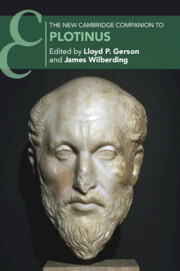Book contents
- The New Cambridge Companion to Plotinus
- Other Volumes in the Series of Cambridge Companions
- The New Cambridge Companion to Plotinus
- Copyright page
- Contents
- Figures
- Tables
- Contributors
- Acknowledgements
- Porphyry’s Arrangement of the Enneads
- Abbreviations of Other Ancient Works and Authors
- Introduction
- Part I Historical Context
- Part II Metaphysics and Epistemology
- 5 Plotinus and the Theory of Forms
- 6 Plotinus on Number
- 7 Plotinus on Categories
- 8 Plotinus on Knowledge
- Part III Psychology
- Part IV Natural Philosophy
- Part V Ethics
- Bibliography
- Index Locorum
- Index
- Other Volumes in the Series of Cambridge Companions (continued from page ii)
5 - Plotinus and the Theory of Forms
from Part II - Metaphysics and Epistemology
Published online by Cambridge University Press: 25 May 2022
- The New Cambridge Companion to Plotinus
- Other Volumes in the Series of Cambridge Companions
- The New Cambridge Companion to Plotinus
- Copyright page
- Contents
- Figures
- Tables
- Contributors
- Acknowledgements
- Porphyry’s Arrangement of the Enneads
- Abbreviations of Other Ancient Works and Authors
- Introduction
- Part I Historical Context
- Part II Metaphysics and Epistemology
- 5 Plotinus and the Theory of Forms
- 6 Plotinus on Number
- 7 Plotinus on Categories
- 8 Plotinus on Knowledge
- Part III Psychology
- Part IV Natural Philosophy
- Part V Ethics
- Bibliography
- Index Locorum
- Index
- Other Volumes in the Series of Cambridge Companions (continued from page ii)
Summary
At their first meeting, Porphyry took Plotinus for ‘a complete fool’ and a sophist. This reaction was by no means exceptional.1 The leading Platonists of the time, most notably Longinus, misclassified Plotinus as a representative of an Oriental, Pythagoreanizing version of Platonism.2 Admittedly, it was not easy to understand the novelty of his views. At stake in the discussions with Porphyry and Longinus was the claim that the intelligibles are not outside the Intellect. Marginal as it might appear at first sight, Plotinus’ thesis actually paved the way to a new interpretation of Plato’s Forms, the kernel for any Platonist system. After an intense exchange, Porphyry ‘finally managed to understand what he was saying’,3 wrote a retraction, and became one of his most faithful pupils for the years to come. Most of the other Platonists, however, continued to endorse their traditional interpretation. But in the meantime, the history of ancient Platonism had entered a new phase.
- Type
- Chapter
- Information
- The New Cambridge Companion to Plotinus , pp. 115 - 135Publisher: Cambridge University PressPrint publication year: 2022
- 1
- Cited by

